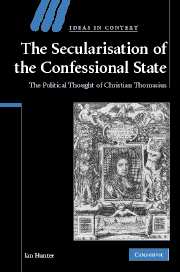Book contents
- Frontmatter
- Contents
- Preface
- Acknowledgements
- Introduction
- Chapter 1 Religion, politics and the university
- Chapter 2 The reform of philosophy
- Chapter 3 Natural law as political psychology
- Chapter 4 Staatskirchenrecht: the religious rights of the prince
- Chapter 5 The toleration of heretics
- Appendix: On the right of Protestant princes regarding heretics
- Index
Chapter 3 - Natural law as political psychology
Published online by Cambridge University Press: 22 September 2009
- Frontmatter
- Contents
- Preface
- Acknowledgements
- Introduction
- Chapter 1 Religion, politics and the university
- Chapter 2 The reform of philosophy
- Chapter 3 Natural law as political psychology
- Chapter 4 Staatskirchenrecht: the religious rights of the prince
- Chapter 5 The toleration of heretics
- Appendix: On the right of Protestant princes regarding heretics
- Index
Summary
In much of the scholarship devoted to Thomasius since the 1970s, his natural law writings have been treated as foundational for the rest of his programme. Here ‘foundational’ takes its meaning from modern moral philosophy and its post-Kantian historiography: namely, as signifying an attempt to discover and justify the moral philosophical principles or laws that provide the normative basis of human conduct as such, including juridical and political conduct. This assumption has led to Thomasius's natural law writings being approached as if their central preoccupation is the relation between morality and law. In turn, the morality–law relation has been construed via the defensive role of individual subjective rights and freedoms in relation to state power and positivistic law. Approaching Thomasius as a natural law philosopher in this way thus allows him to be integrated into a pan-European (potentially global) history of liberal rights and freedoms, identified with the Aufklärung. Here he can be praised by those who regard his separation of morality and law as providing a normative defence of such rights and freedoms; criticised by those who see the separation as granting too much autonomy to a ‘positivistic’ law; and treated as a ‘transitional figure’ by those who regard his attempt at the former as only partially successful, owing to the persistent political absolutism expressed in the latter.
In Chapter 2, however, we indicated that natural law was not the foundation of Thomasius's thought but an element of his wide-ranging reform of Lutheran Schulphilosophie.
- Type
- Chapter
- Information
- The Secularisation of the Confessional StateThe Political Thought of Christian Thomasius, pp. 84 - 112Publisher: Cambridge University PressPrint publication year: 2007

